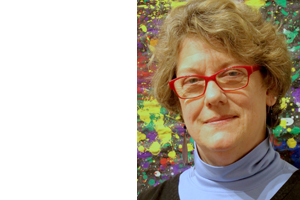Subscribe: Apple Podcasts | RSS
Lois Hetland is a MassArt professor and among the nation’s leading scholars on the value of arts education. She discusses her research into the Studio Habits of Mind, eight dispositions that students develop through meaningful education in the visual arts.
 Lois Hetland, Ed.D., is Professor and Graduate Coordinator in the Art Education Department at the Massachusetts College of Art and Design and Senior Research Affiliate at Project Zero at the Harvard Graduate School of Education. Trained in music and visual arts, she taught elementary and middle school students for 17 years. Currently, she is co-authoring Studio Thinking in the Elementary School, expected in 2018; co-authoring a chapter on a participatory evaluation of Art21 Educators (conducted 2010-2012); and working with ABT Associates to evaluate nine partnerships among community arts organizations, universities, and schools in Wisconsin and Alaska, funded by the Margaret A. Cargill Foundation.
Lois Hetland, Ed.D., is Professor and Graduate Coordinator in the Art Education Department at the Massachusetts College of Art and Design and Senior Research Affiliate at Project Zero at the Harvard Graduate School of Education. Trained in music and visual arts, she taught elementary and middle school students for 17 years. Currently, she is co-authoring Studio Thinking in the Elementary School, expected in 2018; co-authoring a chapter on a participatory evaluation of Art21 Educators (conducted 2010-2012); and working with ABT Associates to evaluate nine partnerships among community arts organizations, universities, and schools in Wisconsin and Alaska, funded by the Margaret A. Cargill Foundation.
Previous work includes research for the co-authored book, Studio Thinking 2: The Real Benefits of Visual Arts Education (2013, Teachers’ College, 2nd edition; 1st edition, 2007), supported by the Getty and Ahmanson Foundations (2001-2004); Principal Investigator on a research and professional development project in Alameda County, CA, funded by successive US Department of Education grants (2003-2010); collaboratively conducting ten meta-analytic reviews with Dr. Ellen Winner analyzing the effects of arts learning on academic outcomes, funded by the Bryant Family Foundation (1997-2000); leading an assessment initiative at MassArt resulting in the first set of college-wide graduation goals (2009-2013); serving as Co-Principal Investigator on Qualities of Quality: Understanding Excellence in Arts Education (2005-2008), funded by the Wallace Foundation; serving as Co-Principal Investigator on a National Science Foundation quasi-experimental study of potential transfer from visual arts learning to geometric spatial reasoning (2008-2013); and co-leading the Studio Thinking Network, a monthly online conversation among US and international educators who use the Studio Thinking Framework (2012-2014).
